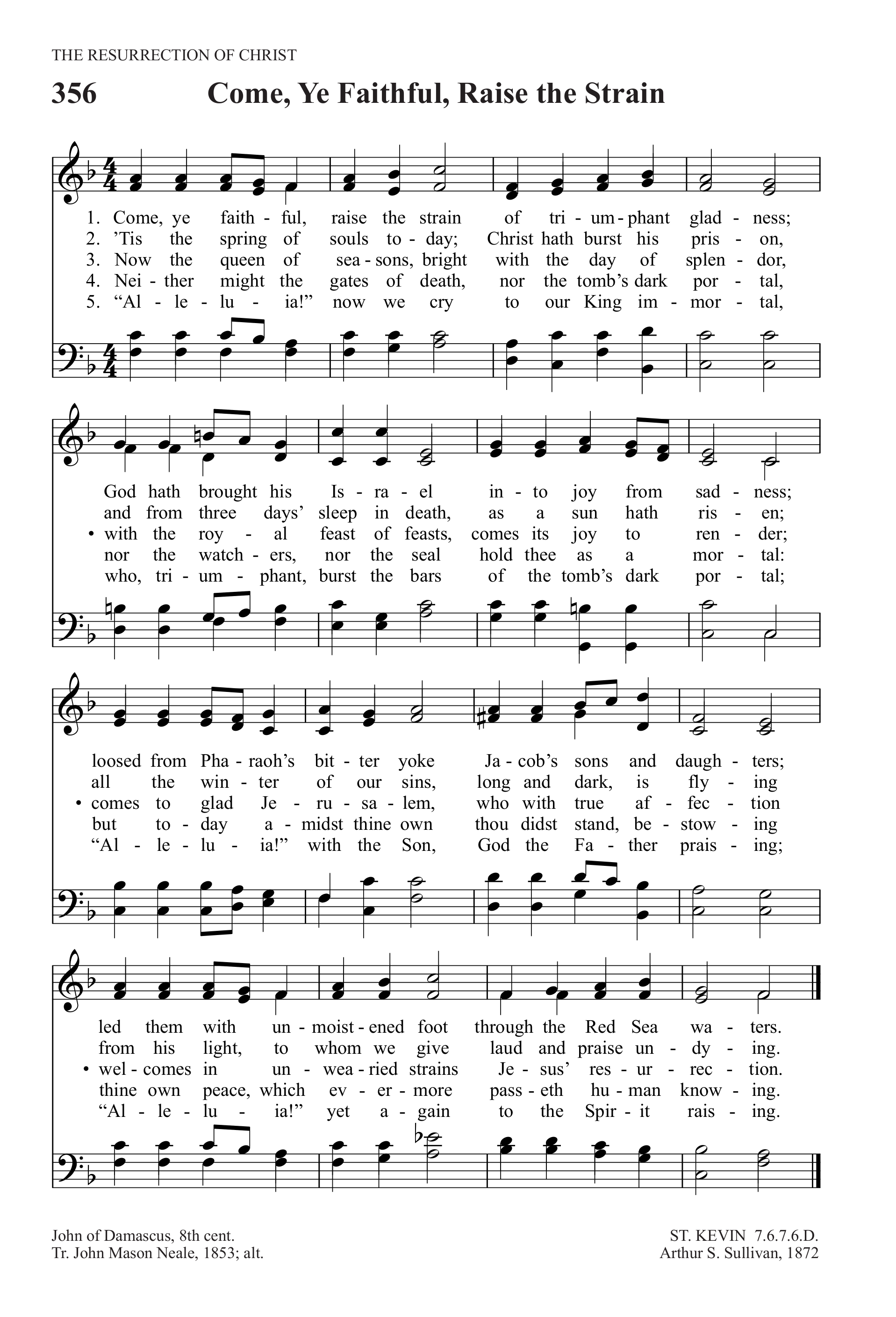Come, Ye Faithful, Raise The Strain
By J. M. Neale
Lyrics
of triumphant gladness;
God hath brought forth Israel
into joy from sadness;
loosed from Pharaoh's bitter yoke
Jacob's sons and daughters,
led them with unmoistened foot
through the Red Sea waters.
Christ hath burst His prison,
and from three days' sleep in death
as a sun hath risen;
all the winter of our sins,
long and dark, is flying
from His light, to whom we give
laud and praise undying.
with the day of splendor,
with the royal feast of feasts,
comes its joy to render;
comes to glad Jerusalem,
who with true affection
welcomes in unwearied strains
Jesus' resurrection,
nor the tomb's dark portal,
nor the watchers, nor the seal
hold Thee as a mortal;
but today amidst the twelve
Thou didst stand, bestowing
that Thy peace which evermore
passeth human knowing.
to our King immortal,
who, triumphant, burst the bars
of the tomb's dark portal;
"Alleluia!" with the Son,
God the Father praising,
"Alleluia!" yet again
to the Spirit raising.
Bible Reference
Psalm 118:15-16
About This Hymn
"Come, Ye Faithful, Raise the Strain" is a jubilant Easter hymn that beautifully blends ancient Christian theology with poetic English verse. The original Greek text was written in the eighth century by St. John of Damascus, one of the most influential hymn writers and theologians of the Eastern Orthodox Church. The hymn was part of the “Golden Canon,” a series of Resurrection hymns used in the Orthodox Easter liturgy, celebrating the victory of Christ over death. Drawing from passages such as Psalm 118:15-16, which declares, “The voice of rejoicing and salvation is in the tabernacles of the righteous: the right hand of the Lord doeth valiantly,” this hymn bursts with triumphant imagery, proclaiming the joy of redemption and the everlasting life secured by Christ’s resurrection. Its focus is entirely Christ-centered, emphasizing His power to conquer death and His gift of salvation to believers.
In 1859, John Mason Neale, an Anglican priest and scholar, translated this hymn into English, preserving the beauty and theology of the original while making it accessible to Western congregations. Neale was deeply committed to the recovery of early Christian hymns and liturgies, seeing them as treasures of the universal Church. His translation of “Come, Ye Faithful, Raise the Strain” showcases his linguistic skill, his sensitivity to poetry, and his profound reverence for Scripture. Neale’s work opened a window for English-speaking Christians to experience the ancient worship traditions of the Eastern Church, and this hymn quickly became a beloved part of Easter celebrations in many denominations.
The hymn is most often sung to the tune “St. Kevin,” composed by Arthur Sullivan in 1872, which matches the hymn’s energy and joy with a bright and triumphant melody. Its jubilant tone and historical depth make it an enduring favorite, connecting modern worshippers to the early Church and its rich hymnody. “Come, Ye Faithful, Raise the Strain” calls Christians to join in a worldwide and timeless chorus of praise to Christ, the risen Lord, whose resurrection has transformed sorrow into joy and brought salvation to all who believe. This hymn remains a profound reminder of the unbroken unity of the Church across centuries, languages, and traditions, echoing the eternal celebration of Easter’s victory.


📬 Subscribe to Our Devotional Updates
Receive weekly hymns, devotionals, and website features directly in your inbox.
Hymn Information

- Category: Hymn
- Author/Writer: J. M. Neale (1859)
- Added: August 29, 2025
- Last Updated: August 29, 2025
- Views: 684
To view the author's biography, click their name above.
MIDI File
Popular Hymns
Recent Blog Posts
Popular Blog Posts
Visit Us on Social Media
Latest from X (Twitter)
Tweets by HymnalLibraryLatest from Facebook
Latest on YouTube
Daily Bible Verse
Disclaimer
The hymns, sheet music, MIDI files, and related content on this website are provided for educational and research purposes only.
- Public Domain: Many of the hymns featured here are in the public domain and may be freely used.
- Copyrighted Works: Some hymns may still be under copyright protection. Where applicable, permission has either been requested from the copyright owner, or the content is shared under the principles of fair use for educational purposes.
⚠️ Important Notice: If you wish to reproduce, distribute, or use any copyrighted hymn beyond personal study or educational use, you must obtain permission directly from the copyright holder. This website does not grant any rights for commercial use yet.
If there is any other question please address it to us in our Contact Page, for further assistance. Thank you for using the site. May God Bless You.













